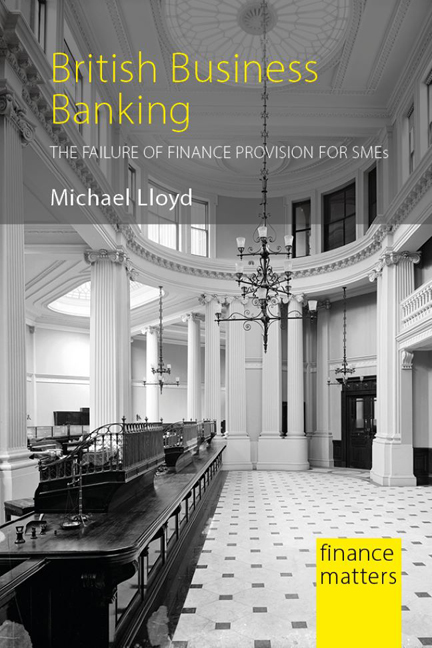Book contents
- Frontmatter
- Contents
- Acknowledgements
- Introduction
- 1 British banks and the industrial revolution
- 2 Modern British banking since 1900
- 3 From the other side: the culture of British SMEs
- 4 Banking problems for SMEs and alternative financial provision
- 5 UK financial and political economic culture
- 6 Optimum financial institutional structures and SME performance
- 7 Implementing reform
- Notes
- References
- Index
5 - UK financial and political economic culture
Published online by Cambridge University Press: 20 December 2023
- Frontmatter
- Contents
- Acknowledgements
- Introduction
- 1 British banks and the industrial revolution
- 2 Modern British banking since 1900
- 3 From the other side: the culture of British SMEs
- 4 Banking problems for SMEs and alternative financial provision
- 5 UK financial and political economic culture
- 6 Optimum financial institutional structures and SME performance
- 7 Implementing reform
- Notes
- References
- Index
Summary
National political and economic policies and preferences determine the environment in which banking systems operate. They also influence the activities of business, including SMEs, which in turn influence the nature and rate of economic growth. This chapter will analyse the differing political economic frameworks in the UK, Germany, and the United States. It should be said that the two “models” of political economy discussed in this chapter – the liberal market economy and the coordinated market economy – are stylised representations of real economies. Moreover, they have developed incrementally over the past 150 years or so and there has been no specific government decision to adopt one or the other of the models, they have just grown.
The UK liberal market economy
The origins of the UK's adoption of a liberal market economy as its preferred political economic approach date back to the changing geopolitical and geoeconomic conditions of the eighteenth and nineteenth centuries and the political philosophy embraced by the intellectual and political elites at that time. During the first part of the nineteenth century the “mercantilist”, protectionist approach to trade had continued from the eighteenth century (and indeed earlier). The spread of the British Empire had accelerated with the dominance of the Royal Navy's control of sea routes after the Napoleonic Wars ended in 1815. The East India Company had by 1800 already captured and occupied almost the whole of India. The aim of occupying territories such as India and particularly the Caribbean was to maintain control of the supply of staple commodities and Navigation Acts were passed to ensure that as much trade as possible was carried in British ships.
However, the middle of the nineteenth century was to see a significant change in British economic and trade policy. Informed by the intellectual contributions of Adam Smith and David Ricardo, in the second half of the eighteenth and the first part of the nineteenth century, economic doctrines of competitive markets and comparative advantage in trade were gradually absorbed and endorsed by the political elites. The key shift was the endorsement of Ricardo's comparative advantage/free trade approach with the repeal of the Corn Laws (which had imposed a high tariff on cereal grains) in 1846.
- Type
- Chapter
- Information
- British Business BankingThe Failure of Finance Provision for SMEs, pp. 97 - 118Publisher: Agenda PublishingPrint publication year: 2021

